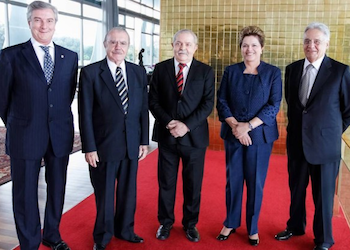A long-running corruption scandal in Brazil involving numerous elites has expanded once again after a judge approved petitions to open investigations into dozens more politicians, including several top officials in the current government, for their suspected involvement in a massive graft scheme.
On April 11, Brazilian Supreme Court judge Edson Fachin authorized new investigations of upwards of 70 suspects who were implicated in corrupt activities in plea bargain testimony provided by executives of the country’s largest construction firm, Odebrecht S.A.
The testimonies were obtained from dozens of current and former executives of Odebrecht, a company that has publicly admitted that its “Division of Structured Operations” paid officials from governments across Latin America a total of nearly $800 million in bribes over more than a decade in order to secure public works contracts. Almost half of the total amount of the bribe payments was made in Brazil.
According to a database compiled by O Globo, Fachin’s decision raises to 97 the number of Brazilian politicians under investigation by the Supreme Court in connection with the scheme. (Brazil’s legal system requires the Supreme Court to approve and carry out certain types of investigations against top government officials.)
A prosecutor working on the case said last month that the Odebrecht executives’ testimonies could lead to “upward of 350 new investigations” related to the case.
SEE ALSO: Brazil News and Profiles
Among the names on “Fachin’s List,” as the Brazilian media has dubbed it, are those of eight ministers in the administration of current President Michel Temer, including his chief of staff, his general secretary, his foreign minister and others.
In addition, more than 60 of the country’s 594 senators and congressional representatives, including lower house President Rodrigo Maia, were named on the list, as were several governors.
Relatedly, each of Brazil’s five most recent presidents has been implicated in the Odebrecht scandal. Four of these — Dilma Rousseff, Luiz Inácio “Lula” da Silva, Fernando Henrique Cardoso and José Sarney — will face corruption investigations in a lower court.
The remaining ex-president, Fernando Collor, will be investigated by the Supreme Court due to his status as a current senator. Current President Temer has also been linked to the scandal, but he cannot be investigated because he has “temporary immunity” as president.
Former Odebrecht President Marcelo Odebrecht has testified as part of a plea deal that both Rousseff and da Silva were aware that the firm was involved in making large illicit payments to support their presidential campaigns.
Da Silva denied wrongdoing and criticized prosecutors for “accusing everyone without proof” in a recent interview with Rádio Metrópole. Temer has also dismissed the allegations against him. Rousseff and Cardoso have not commented publicly.
Other elites from around the region have also been tied to the scandal. For example, Marcelo Odebrecht testified that former Peruvian President Ollanta Humala received some $3 million in campaign funding from the company. Another ex-president of Peru, Alejandro Toledo, is wanted in his home country for allegedly taking some $20 million in bribes from Odebrecht.
InSight Crime Analysis
The continued expansion of the Odebrecht investigations could impact political and economic stability in Brazil, which is currently facing the worst recession in its history. The probes now being launched against so many top officials — combined with Temer’s abominable approval ratings, which are barely hovering above the single digits — could complicate efforts to implement policies and pass legislation necessary to deal with the country’s urgent economic challenges.
This could have implications for the country’s broader security situation. For example, budget shortfalls were blamed for a wave of crime and violence earlier this year in the state of Espírito Santo, where a military police strike left the streets with a severe shortage of officers. Similarly, a budget crisis in Rio de Janeiro spurred the federal government to send thousands of military police to reinforce security in the city ahead of its world-famous Carnival celebration in late February.
Additionally, chronic underfunding of the country’s hellish prison system has allowed gangs to turn penetentiaries into bases of recruitment and operations, as well as bloody battlegrounds for conflicts with rival groups.
SEE ALSO: InDepth Coverage of Elites and Organized Crime
In the absence of successful action by the Brazilian government to get the economy back on track, such problems are likely to persist — and potentially worsen — posing a serious threat to security in Latin America’s largest and most populous nation.
At the same time, many questions remain regarding the outlook for the new investigations. Past experience suggests that these cases will move slowly through Brazil’s overburdened Supreme Court, and there is the possibility that some of those accused may take plea deals that reduce their sentences in exchange for providing information relevant to the probes. It is also possible that political elites may band together to pass some sort of amnesty for those accused of involvement in the Odebrecht scandal, though such a move would have to overcome significant political obstacles.
While recent anti-graft investigations in Brazil have gained widespread popular support for helping to expose the systemic nature of corruption in the country, their ultimate impact remains to be seen. Historical examples of similar wide-ranging anti-corruption drives in other countries, like Italy, suggest that such efforts do not always result in entirely successful outcomes.

